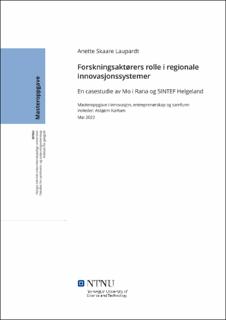| dc.contributor.advisor | Karlsen, Asbjørn | |
| dc.contributor.author | Laupardt, Anette Skaare | |
| dc.date.accessioned | 2022-07-19T17:23:24Z | |
| dc.date.available | 2022-07-19T17:23:24Z | |
| dc.date.issued | 2022 | |
| dc.identifier | no.ntnu:inspera:108358051:9695352 | |
| dc.identifier.uri | https://hdl.handle.net/11250/3007069 | |
| dc.description.abstract | Det er et økende behov for omstilling i norsk næringsliv, som et tiltak for å bremse dagens CO2 utslipp i bestrebelsene på å nå bærekraftsmålene i Paris-avtalen. En viktig ingrediens i næringslivets omstillingsevne er behovet for økt bruk av innovasjon i utviklingen av bærekraftige produksjonsprosesser og nye næringsretninger. I Helgelandsregionen har man de siste årene sett utviklingstrekk i denne retninger, hvor industri og næringsliv har hatt et økt fokus på å styrke regionens innovasjons- og omstillingsevne i samspill med lokale myndigheter, utviklingsaktører og forskningsaktører. Gjennom disse aktivitetene har man etablert et regionalt innovasjonssystem, styrket samarbeidsnettverk og satt seg en felles visjon for næringslivets utvikling. Oppgaven tar for seg Mo i Rana for å undersøke hvordan man jobber med innovasjon i industri og næringsliv i byen og SINTEF Helgeland sin rolle i systemet. Formålet med oppgaven er å besvare følgende forskningsspørsmål:
I. Hvordan er innovasjonssystemet som Mo inngår i bygd opp, og hvordan stimulerer systemet til innovasjon?
II. Hvordan bidrar SINTEF Helgeland med innovasjon i Mo?
Problemstillingen blir besvart ved bruk av kvalitativ metode og en casetilnærming som tar for seg Mo og SINTEF Helgeland. Det empiriske grunnlaget blir hentet fra dybdeintervjuer med aktører i byen og dokumentstudier som tilleggsdata. De empiriske funnene blir diskutert opp mot hovedteoriene nasjonale- og regionale innovasjonssystemer, samt teori knyttet til påvirkning på aktør-systemnivå som et supplement til manglende perspektiver i innovasjonssystemrammeverket. I tillegg benytter oppgaven seg av teori rundt næringsklynger og bærekraftig utvikling i regional kontekst.
Aktører på systemnivå og samfunnsentreprenører har spilt en viktig rolle i å mobilisere relevant kompetanse til industriens virksomhetsområde, for å heve regionens innovasjonsevne og styrke næringslivets konkurransefortrinn innen grønne industriretninger. Næringsklyngen ACT spiller en viktig rolle for å stimulere til økt innovasjon og knytte sterkere samarbeidsnettverk mellom klyngens medlemsbedrifter. I tillegg spiller regionskontoret SINTEF Helgeland en viktig rolle som forskningsaktør i å skaffe midler fra nasjonale virkemiddelaktører og fungerer i stor grad som en innovasjonspartner for bedriftene i regionen. Deres tilknytning og nettverk i SINTEF konsernet bidrar også til økt kompetanse innen industriens virksomhetsområder. | |
| dc.description.abstract | There is an increasing need for restructuring in the Norwegian industry, as a measure to curb current CO2 emissions in efforts to achieve the Sustainable Development Goals (SDGs) in the Paris Agreement. An important ingredient for the restructuring capacity of the industry is the need for increased use of innovation in the development of sustainable production processes and new business directions. The Helgeland region has seen development towards this direction in the recent years, where businesses in the region have had an increased focus on strengthening the regions innovation capacity in cooperation with local authorities, business agencies and research institutions. Through these activities a regional innovation system has been established, as well as a strengthened business network and a culture for innovation and development. This thesis examines Mo i Rana to investigate how they use innovation in the local industry, as well as SINTEF Helgeland’s role in the innovation system. The thesis seeks to answer the following research questions:
I. How is the innovation system that Mo is part of structured and how does this system stimulate to innovation?
II. How does SINTEF Helgeland contribute to innovation in Mo?
The research questions are answered using qualitative methods and a case approach that deals with Mo and SINTEF Helgeland. The empirical findings are retrieved from in-depth interviews and document studies as additional data. The empirical findings are discussed in connection with the main theories national and regional innovation systems, as well as theory related to system level agency and social entrepreneurship as a supplement to a lack of perspectives in the innovation system framework. In addition, the thesis uses theory regarding business clusters and sustainable development in a regional context.
System level agents and social entrepreneurs are important in mobilizing relevant competence to the region, increase the regions innovation capacity and strengthen the business sectors competitive advantage within green industries. The ACT business cluster plays an important role in stimulating innovation projects and creating corporate networks. In addition, the regional office SINTEF Helgeland contributes to obtaining grants from national policy instruments and acts as an important innovation partner for the companies in the region. Their affiliation and network in the SINTEF Group also contributes to increased expertise in the industry’s business areas. | |
| dc.language | nob | |
| dc.publisher | NTNU | |
| dc.title | Forskningsaktørers rolle i regionale innovasjonssystemer | |
| dc.type | Master thesis | |
